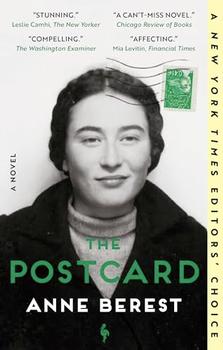Summary | Excerpt | Reading Guide | Reviews | Beyond the Book | Readalikes | Genres & Themes | Author Bio

Chapter One
My mother lit her first lung-charring cigarette of the morning, the one she enjoyed most, and stepped outside to admire the whiteness blanketing the entire neighborhood. At least ten centimeters of snow had fallen overnight.
She stayed outside smoking for a long time despite the cold, enjoying the otherworldly atmosphere of the garden. It was beautiful, she thought, all that blankness, that erasing of colors and blurring of edges.
Suddenly she heard a noise, muffled by the snow. The postman had just dumped the mail on the ground at the foot of the mailbox. My mother went to collect it, putting her slippered feet down carefully so as not to slip.
Cigarette still clamped between her lips, its smoke dissipating in the freezing air, she made her way quickly back to the house to thaw fingers numbed by the cold.
She flipped through the stack of envelopes. There were the usual holiday cards, most of them from her university students, a gas bill, a few pieces of junk mail. There were also letters for my father, from his colleagues at the National Centre for Scientific Research and the PhD candidates he supervised, all wishing him a happy new year.
All very typical for early January. Except for the postcard. Slipped in among the other envelopes, unassuming, as though it had hidden itself deliberately.
What caught my mother's attention right away was the handwriting, strange and awkward, like no handwriting she had ever seen before. Then she read the four names, written in the form of a list.
Ephraïm
Emma
Noémie
Jacques
They were the names of her maternal grandparents, her aunt, and her uncle. All four had been deported two years before she was born. They died in Auschwitz in 1942. And now, sixty-one years later, they had reappeared in our mailbox. It was Monday, January 6, 2003.
Who could have sent me this terrible thing? Lélia wondered.
My mother felt a jolt of fear, as if someone were threatening her, someone lurking in the darkness of the past. Her hands began to tremble.
"Look, Pierre! Look what I found in the mail!"
My father took the postcard and examined it closely, but there was no signature, no explanation.
Nothing. Just those four names.
At my parents' home in those days, one picked the mail up off the ground, like ripe fruit fallen from a tree; our mailbox had gotten so old that it was like a sieve—nothing stayed inside—but we liked it that way. It never occurred to any of us to get a new one; that wasn't how our family solved problems. You simply lived with things, as if they deserved the same respect as human beings.
When the weather was bad, the letters would get soaked, their ink running and the words becoming permanently indecipherable. Postcards were the worst, bare like those teenage girls who run around with exposed arms and no coat in wintertime.
If the author of the postcard had used a fountain pen to write to us, their message would have been obliterated. Had they known that? The names were written with a ballpoint pen.
The following Sunday, Lélia summoned the whole family: my father, my sisters, and me. Sitting around the dining room table, we passed the card from hand to hand. None of us spoke for a long time—which was unusual for us, especially during Sunday lunch. Normally, in our family, there's always someone with something to say, and they always want to say it right now. But on that day, no one knew what to think about this message that had shown up out of the blue.
The postcard itself was nothing special, just a touristy post- card with a photo of the Opéra Garnier on the front, the kind sold by the hundreds in tobacco shops and kiosks all over Paris.
"Why the Opéra Garnier?" my mother asked.
No one knew the answer.
"The postmark is from the Louvre post office."
"You think they could give us more information there?"
"It's the biggest post office in Paris. It's huge. What do you think they'll be able to tell you?"
"Was it mailed from there for a reason, do you think?" "Yeah. Most anonymous letters are sent from the Louvre post office."
"It's not recent. The card itself must be ten years old at least,"
Excerpted from The Postcard by Anne Berest, originally published as La carte postale, copyright Anne Berest 2021. Translation by Tina Kover, copyright 2023 Europa Editions.
The worth of a book is to be measured by what you can carry away from it.
Click Here to find out who said this, as well as discovering other famous literary quotes!
Your guide toexceptional books
BookBrowse seeks out and recommends the best in contemporary fiction and nonfiction—books that not only engage and entertain but also deepen our understanding of ourselves and the world around us.